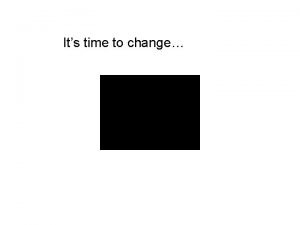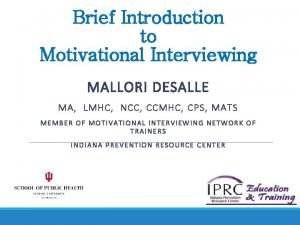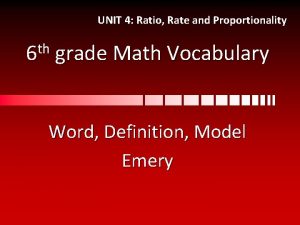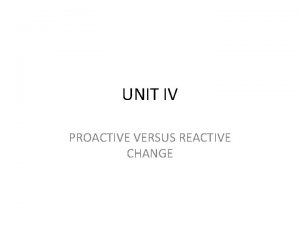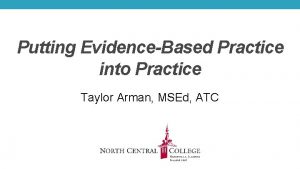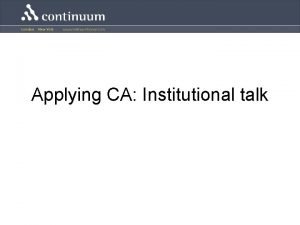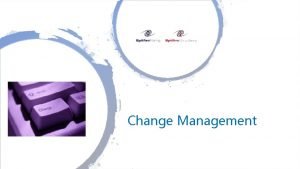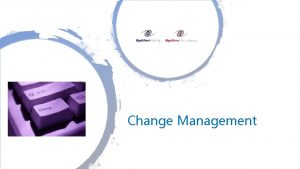Cultivating Change Talk Part 2 Alexander Waitt MSEd






























- Slides: 30

Cultivating Change Talk Part 2 Alexander Waitt, MSEd, LPC Member of the Motivational Interviewing Network of Trainers www. formativeoutcomes. com

Goal of Today’s Webinar: Review and deepen understanding of Change Talk… Brief Review of Change Talk Introduction/Review of “Strategies to elicit change talk” Strategies and Intentionality Listening and Identifying exercise www. formativeoutcomes. com Deepening your skills

A Couple of Points • MI isn’t MI without a specific target behavior • Clients/Patients typically don’t present expressing change talk • Remember that people are ambivalent and they express this in how they talk (language) about a behavior or potential change • Change talk is a fundamental component of MI. If we aren’t working to elicit change talk, we aren’t doing MI www. formativeoutcomes. com

What is change Talk? • Change talk is any language a client/patient makes that favors change. • It is not something that can be ignored. If we are knowingly or not recognizing, responding to, and eliciting change talk, we aren’t doing MI. • It’s more than exploring the “pros & cons” of a behavior change with a client/patient www. formativeoutcomes. com

What is change talk? • A primary component of the technical aspect of Motivational Interviewing • Difficult to pay attention to • Like learning a new language • A specific type of language that favors a patient’s movement towards change • Let’s take a closer look. www. formativeoutcomes. com

Why Change Talk Matters? • Change talk serves as a predictor of behavior change • Preparatory change talk serves as a foundation for Mobilizing Change talk (DARN language leads to CAT language) • Mobilizing change talk is a predictor of behavior change • Without the intentional evoking of change talk, you’re not doing MI!!! www. formativeoutcomes. com

A Closer Look/Review at Change Talk Preparatory Change Talk D A R N (DESIRE): (ABILITY): (REASON): (NEED): want, wish, like can, could, able specific reason for change need to, have to, must, important, etc… (without stating specific reason) Mobilizing Change Talk ---- Commitment Language C (COMMITMENT): A (ACTIVATION): T (TAKING STEPS): will, intend to, going to ready to, willing to (without specific commitment) reporting recent specific action (steps) towards change www. formativeoutcomes. com


Brief Review of Change Talk Introduction/Review of “Strategies to elicit change talk” Strategies and Intentionality Listening and Identifying exercise www. formativeoutcomes. com Deepening your skills

Specific Strategies: It’s all about intent! • Definition of strategy is to carefully and intentionally implement a technique or method • We should be able to explain why we chose to implement a particular strategy and what we were hoping the impact to be. • Let’s break down some Strategies

Ask Evocative Questions • Questions that might elicit change talk. • How will making this change improve your life? • How does this behavior get in the way of your goals?

Ask for Elaboration • Once change talk is expressed by client/patient, ask them to talk more about it or for more detials. client. “I think making this change will make a big difference. ” practitioner. “what does a big difference look like to you”

Ask for Examples • Once change talk is expressed, ask for more examples. client. “While this might be tough, I think I can do it” practitioner. “Give me an example of a time you overcame a tough obstacle. ”

Look Forward or Back • Ask what may happen if things continue without a change (look forward) • Ask the client to reflect on a time before the current behavior/problem was present. (look back) Practitioner. “If you were completely successful in making a change, what would be different in your life? ” (look forward) Practitioner. “When you think about your life before you got involved in drugs, how were things different? ” (look back)

Look Forward or Look Back • C. I just don’t think it can get done. • P. Imagine that three weeks from now, you’ve been successful in making this change. What steps did you take to make it happen? • C. I just don’t think it can get done. • P. Tell me about a time in the past where you had to overcome a challenging experience.

Query Extremes • Exploring worst case scenarios with clients/patients. Practitioner. “If you don’t make a change, what are the worst things that could happen. ” If you do make this change, what are the best things that might happen. ”

Change Rulers to Cultivate Change Talk • Change rulers (Importance, Confidence, Readiness) • On a scale of 1 -10, 10 being the most ready to change, and 1 being not ready at all, where are you in your readiness to change? • What has you at a ______ and not a (lower number) _____? • What would it take to bring you from a (initial given #)____ to a higher number _____?

Exploring Goals and Values • Values can be generally discussed in conversation or more formally explored. • Values Card Sort • When you think about your values, what stands out to you as more important? • You talked about honesty as an important value you hold in your life, how does ______(current behavior) fit in with that value?

Siding with the negative • Can be tricky to pull off. To be successful (as with most of these strategies) you need a really sound relationship and mutual trust or it can come off as condescending. • Explicitly side with the negative side of ambivalence, in hopes of the client/patient coming back and arguing the positive. • _______ plays SUCH an important role in your life, you may never give it up, regardless of the cost.

Brief Review of Change Talk Introduction/Review of “Strategies to elicit change talk” Strategies and Intentionality Listening and Identifying exercise www. formativeoutcomes. com Deepening your skills

Strategies to elicit Desire • Evocative Questions • Ask for Elaboration • Ask for Examples • Look Back/Forward • Importance Ruler • Explore Goals and Values • Coming Alongside

Strategies to elicit Ability • Evocative Questions • Ask for Elaboration • Ask for Examples • Look Back or Forward • Confidence Ruler

Strategies to elicit Reason • Evocative Questions • Ask for Elaboration • Ask for Examples • Look Back/Forward • Query Extremes • Explore Goals and Values • Coming Alongside

Strategies to elicit Need • Evocative Questions • Ask for Examples • Ask for Elaboration • Look Forward • Query Extremes

Brief Review of Change Talk Introduction/Review of “Strategies to elicit change talk” Strategies and Intentionality Listening and Identifying exercise www. formativeoutcomes. com Deepening your skills

Let’s listen for the strategies

Brief Review of Change Talk Introduction/Review of “Strategies to elicit change talk” Strategies and Intentionality Listening and Identifying exercise www. formativeoutcomes. com Deepening your skills

How to Deepen your Skills • Attending training and reading more material will only bring you so far… • Get supervision, a coach, or someone who is qualified to listen to you do MI, can code your practice, and guide you in developing your skill set. • Practice, Practice

Remember… Eliciting change talk is made more difficult when you don’t have a partnership with your client. You’re not doing MI without a clear target behavior and without the active process of eliciting change talk. “We aren’t inviting them into our conversation. Our first task is to be invited into their life and conversation. ”

Please Reach Out Formative Outcomes, LLC Alexander Waitt alexwaitt@formativeoutcomes. com www. formativeoutcomes. com Twitter account: @formativeoutcms
 Talk, read talk write template
Talk, read talk write template Amateurs discuss tactics professionals discuss logistics
Amateurs discuss tactics professionals discuss logistics Problem talk vs solution talk
Problem talk vs solution talk Darn cats motivational interviewing
Darn cats motivational interviewing Agenda mapping bubble sheet
Agenda mapping bubble sheet Ears motivational interviewing
Ears motivational interviewing Amplified reflection example
Amplified reflection example Change talk
Change talk Change talk
Change talk Addition symbol
Addition symbol Unit ratio definition
Unit ratio definition Part part whole
Part part whole What is a technical description
What is a technical description Parts of the bar drawing
Parts of the bar drawing The part of a shadow surrounding the darkest part
The part of a shadow surrounding the darkest part Minitab adalah
Minitab adalah Examples of physical changes
Examples of physical changes Physical change definition
Physical change definition Absolute change and relative change formula
Absolute change and relative change formula Two negative integers
Two negative integers Whats the difference between a chemical and physical change
Whats the difference between a chemical and physical change Difference between supply and quantity supplied
Difference between supply and quantity supplied Supply and demand curve shifts
Supply and demand curve shifts Enagic comp plan
Enagic comp plan Proactive and reactive change
Proactive and reactive change Chemical change and physical change
Chemical change and physical change Spare change physical versus chemical change
Spare change physical versus chemical change Rocks change due to temperature and pressure change
Rocks change due to temperature and pressure change Whats physical change
Whats physical change When does a physical change occur study jams
When does a physical change occur study jams When does a physical change occur study jams
When does a physical change occur study jams





